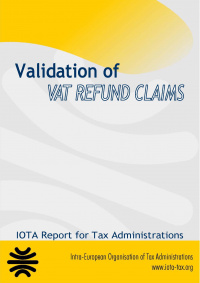Validation of VAT Refund Claims
During recent years there have been fraud cases where VAT refund claims have been used in the fraud scheme. Unfortunately, the cases are frequently detected by the tax administration after the VAT has been refunded. The general experience from these cases is that it is difficult to recover the losses - the fraud has to be stopped before the VAT is refunded. This is why tax administrations need to have a constant, strong focus on the audit of VAT returns - how are the risky VAT refund claims selected and audited by the tax administration before the VAT refund claim is paid out, and is the National VAT refund control system good enough? That is why comparing and identifying good practices amongst the IOTA Member tax administrations is beneficial.
The IOTA Area Group “Prevention and Detection of VAT Fraud (PDVF)” decided at its meeting in September 2008 in Bern, Switzerland, to establish a Task Team to compare the administrative practices and validation processes surrounding VAT refunds in the IOTA region with a view to increasing the effectiveness of the monitoring of VAT refunds and the prevention of related VAT frauds. The Task Team held its first meeting in Vilnius, Lithuania in January 2009 and in September of that year they issued a Questionnaire to all IOTA Member administrations. This Report is based on the responses to that Questionnaire. The Questionnaire consisted of the following parts:
- Part 1 - VAT settlement by taxpayer;
- Part 2 - Validation of VAT refund claims by the tax authority;
- Part 3 - Formalities of the VAT refund validation process;
- Part 4 - Evaluation of the VAT refund validation process.
The aim of the Task Team for VAT refund claims was to prepare a comparative study of the VAT refund validation processes and good practises in the IOTA region; to increase the effectiveness of the monitoring of VAT refunds and thereby enhance the prevention of VAT fraud.
Information and answers referred to in this Report generally apply to 2009, the period during which the study was conducted. However, any figures and statistics included relate to 2008 as this was the latest calendar year for which statistics were available.
During the preparation of the material used in this publication, input was provided by members from the IOTA Area Group “Prevention and Detection of VAT Fraud”, who represent the majority of the IOTA Member tax administrations and who supported the efforts of the Task Team to collect experiences in the field of the audit of VAT returns. The IOTA Secretariat would like to thank all of them and particularly the following Task Team members: Mincho Muskurov (Bulgaria), Erik Andersen (Denmark), Theo Cornelissen (Netherlands), Guri E. Stange Lystad (Norway), Mateusz Grynicz (Poland), Sandra Luzia Assunção Rocha (Portugal) and Jean-Luc Wichoud (Switzerland) who compiled this Report.
